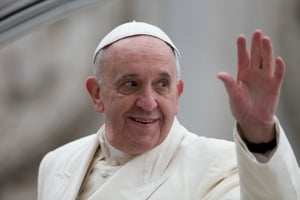GENEVA -- The Vatican on Friday faced criticism from a United Nations panel for the second time this year over failures to report priests accused of sexually abusing children or to ensure redress for victims.
The panel, which is monitoring the Holy See's compliance with an international treaty prohibiting torture, called on the Vatican to "take effective measures" to monitor the behavior of individuals under its control and prevent abuse.
In a statement, the Holy See said the Committee Against Torture had not found it in violation of the treaty, which prohibits torture and other forms of cruel, inhumane or degrading treatment.
Panel members bluntly contradicted that assertion. The committee had issued eight pages of recommendations to the Holy See over what it said were its failures in preventing abuse, investigating accusations and compensating victims, Felice Gaer, the committee's vice chairman, told reporters in Geneva.
"You have the answer in front of you," she said.
The 10-member committee welcomed guidelines issued by the Vatican's disciplinary body instructing church authorities to cooperate with civil authorities but expressed concern that they continued to "resist the principle of mandatory reporting." The committee cited the case of Archbishop Paul Gallagher, the papal envoy to Australia who invoked diplomatic immunity last year in refusing to provide documents that could assist a commission of inquiry into sex abuse.
The committee rejected the Holy See's defense that it has jurisdiction only over priests and personnel inside its walls in Rome.
The Vatican faced many of the same criticisms this year when it appeared before another U.N. panel monitoring its compliance with the international convention on children's rights.
The committee on torture Friday noted a number of recent measures introduced by the Vatican, including Pope Francis' creation in December of a Commission for the Protection of Minors and the 2011 guidelines instructing church authorities to report allegations of clerical sexual abuse to civil authorities where required by law. It also welcomed a law adopted by the Vatican City State last year setting out a definition of torture described by the chairman of the panel, Claudio Grossman, as "a role model" and an example of "very important, positive developments."
But the committee expressed concern over numerous reports that church authorities had transferred priests accused of abuse to other dioceses, helping them to escape investigation and prosecution, allowing them to remain in contact with children and, in some cases, leading to further abuse.
The panel cited the specific case of the Rev. Joseph Palanivel Jeyapaul, who was accused of sexually abusing a 14-year-old girl in Minnesota and returned to India, where he is facing an extradition application by the United States.
It also referred to the case of Archbishop Josef Wesolowski, who has been accused of sexual abuse in the Dominican Republic. The archbishop was transferred to the Vatican, where officials say he is under investigation. Officials have resisted applications for his extradition to Poland, his native country.
The committee recommended that the Holy See set up an independent complaints mechanism that ensures confidentiality for victims of abuse and is empowered to cooperate with civil authorities where the abuse occurred. It also urged the Vatican to ensure that investigators of abuse "are independent, with no hierarchical connection."
The committee voiced further dissatisfaction with how the church has handled redress for victims.
Pamela Spees, senior staff attorney for the Center for Constitutional Rights, which submitted a report to the committee on behalf of the Survivors Network of those Abused by Priests, said, "It's a report that victims and survivors and advocates can use to try to have these crimes taken seriously and dealt with more effectively by national judicial systems, whether in the criminal context or to advocate for more reforms and protections."
The Holy See, in its response to the panel's observations, said charges related to moving clergy members to evade discipline and failures to provide compensation were "part of the past." It said that it "takes note and will give serious consideration to the recommendations made."
A Section on 05/24/2014

